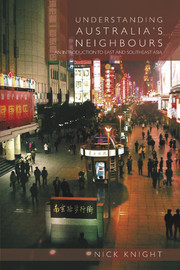Book contents
- Frontmatter
- Contents
- List of illustrations
- Acknowledgments
- Maps
- Introduction: Thinking about Asia, thinking about Australia
- 1 The Idea of ‘Asia’: Australia's ‘Near North’ – East and Southeast Asia
- 2 Tradition and Modernity in East and Southeast Asia: The family
- 3 Tradition and Modernity in East and Southeast Asia: Religion
- 4 Colonialism in East and Southeast Asia: How important was the impact of the West?
- 5 Nationalism and Revolution in East and Southeast Asia
- 6 Nations and Nation-Building in East and Southeast Asia
- 7 International Politics and East and Southeast Asia: The Cold War and the Sino-Soviet Split
- 8 The Rise and Decline of the Japanese Economic ‘Miracle’
- 9 The Newly Industrialising Economies of East and Southeast Asia: Economic growth and economic challenge
- 10 Democracy and Human Rights
- 11 Globalisation and East and Southeast Asia
- 12 Australia and Asia, ‘Asia’ in Australia
- Bibliography
- Index
- Plate section
- References
3 - Tradition and Modernity in East and Southeast Asia: Religion
Published online by Cambridge University Press: 05 June 2012
- Frontmatter
- Contents
- List of illustrations
- Acknowledgments
- Maps
- Introduction: Thinking about Asia, thinking about Australia
- 1 The Idea of ‘Asia’: Australia's ‘Near North’ – East and Southeast Asia
- 2 Tradition and Modernity in East and Southeast Asia: The family
- 3 Tradition and Modernity in East and Southeast Asia: Religion
- 4 Colonialism in East and Southeast Asia: How important was the impact of the West?
- 5 Nationalism and Revolution in East and Southeast Asia
- 6 Nations and Nation-Building in East and Southeast Asia
- 7 International Politics and East and Southeast Asia: The Cold War and the Sino-Soviet Split
- 8 The Rise and Decline of the Japanese Economic ‘Miracle’
- 9 The Newly Industrialising Economies of East and Southeast Asia: Economic growth and economic challenge
- 10 Democracy and Human Rights
- 11 Globalisation and East and Southeast Asia
- 12 Australia and Asia, ‘Asia’ in Australia
- Bibliography
- Index
- Plate section
- References
Summary
in theprevious chapter, we examined the concept of tradition and compared it to the idea of modernity. I suggested that it was useful to think about tradition in relation to community, and in particular the notion that in a traditional society people had a much stronger bond of affinity to place and family than they do in modern society. Traditional societies were based on agriculture, and most people lived in villages with little contact with the outside world. There was little mobility, either geographically or socially. People lived and died in the village and class into which they had been born. Traditional societies therefore tended to be rather static, although not completely unchanging. Patterns of behaviour – rituals, customs, the habits of daily life – were passed on from one generation to the next, and things were done in a particular way for the simple reason that they had always been done that way. Behaviour became habitual. The lack of outside influences strengthened the force of habit that was a hallmark of traditional societies. Modernisation, industrialisation and urbanisation changed the structure and function of the family. In particular, the extended family and stem family gave way to the nuclear family; people gained greater choice in the selection of their marriage partner; families became smaller; and the role of women changed (although more so in some societies than others).
- Type
- Chapter
- Information
- Understanding Australia's NeighboursAn Introduction to East and Southeast Asia, pp. 40 - 57Publisher: Cambridge University PressPrint publication year: 2004



